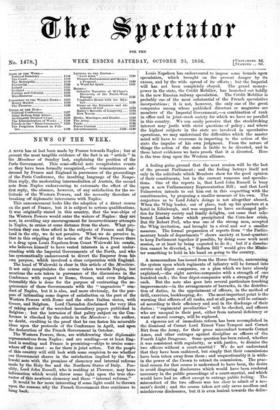NEWS OF THE WEEK.
A MOVE has at last been made by France towards Naples ; but at present the most tangible evideuoe of the fact is an " article " in t.6 Moniteur of Sunday last, explaining the position of the Paris Government. This semi-official note recapitulates events as they have been formally recognized,—the remonstrances ad- dressed by France and England in pursuance of the proceedings of the Paris Conference, the insulting language of the Neapo- litan reply, the moderating intermediation of Austria, the second note from Naples endeavouring to extenuate the effect of the first reply, the absence, however, of any satisfaction for the so- licitude of the Western Powers, and the necessity therefore of breaking off diplomatic intercourse with Naples.
This announcement looks like the adoption of a direct course on the part of France, but it is subject to serious qualifications. It was originally stated in this country, that the war-ships of the Western Powers would enter the waters of Naples : they are now, in avoiding any encouragement for insurrectionary attempts in Naples, to cruise at some distance from the shore. What pro- tection they can thus afford to the subjects of France and Eng- land in the city, we do not perceive. What we do perceive is, that in this crippling of the action of the Western Powers there is a drag upon Louis Napoleon from Count Walewski his cousin, who believes himself to have vested interests in a good under- standing with the Imperial Governments of the North, and who has systematically endeavoured to divert the Emperor from his own purpose, which involved a close cooperation with England.
The hand of Walewski is clear in this article of the Moniteur. It not only recapitulates the course taken towards Naples, but mentions the sots taken in pursuance of the discussions in the Conference with respect to Rome, Greene, and even Belgium. Ostensibly this is done for the purpose of contrasting the ac- quiescence of these Governments with the " ungracious " e'en- duet of Naples, but it is also, and more obviously, for the pur- pose of intimating some degree of satisfaction on the part of the Western Powers with Rome and the other Italian states, with Greece, and Belgium. Lord Clarendon disclaimed the very idea of taking notice of the wretched inoendiary papers published in Belgium ; but the intrusion of that paltry subject on the Con- ference is clinched by the article in the Moniteur ; the author, no doubt, exulting in the proof that he oan fasten. his miserable ideas upon the protocols of the Conference in April, and upon the declaration of the French Government in October.
The Western Powers, then, are withdrawing their diplomatic representatives from Naples ; and are sending—or at least Eng- land is sending and France is promising—ships to cruise some- where off the coast : so far there is joint action. -Yet the people of this country will still look with some suspicion to see whether our Government shares in the satisfaction implied by the Wa- lewski note with the promises of clemency and internal reforms made by the Holy See and the Northern States of Italy. Pos- sibly, Lord John Russell, who is residing at Florence, may have information which would throw some light upon the true cha- racter of this newborn clemency and these " internal reforms." It would be far more interesting if some light could be thrown upon the reasons why the French Government thus continues to hang back. Louis Napoleon has endeavoured to impose some bounds upon speculation, which brought on the present danger by its excess, and by the wide spread of its efforts ; but the Imperial will ;as not been completely obeyed. The grand money- power in the state, the Credit Mobilier, has launched out boldly in the new Russian railway speculation. The Credit Mobilier is probably one of the most substantial of the French speculative incorporations ; it is not, however, the only one of the great companies among whose published directors or magnates are members of the Imperial Government,—a combination of rank in office and in joint-stock society for which we have no parallel in this country. We can easily perceive that the stockbroking interest may jostle with strict questions of policy; and where the highest subjects in the state are involved in speculative operations, we may understand the difficulties which the master mind will have to overcome in imparting to the action of the state the impulse of his own judgment. From the nature of things the action of the state is liable to be diverted, and in these latest evidences we have proofs that it is diverted. Here is the true drag upon the Western alliance.


























